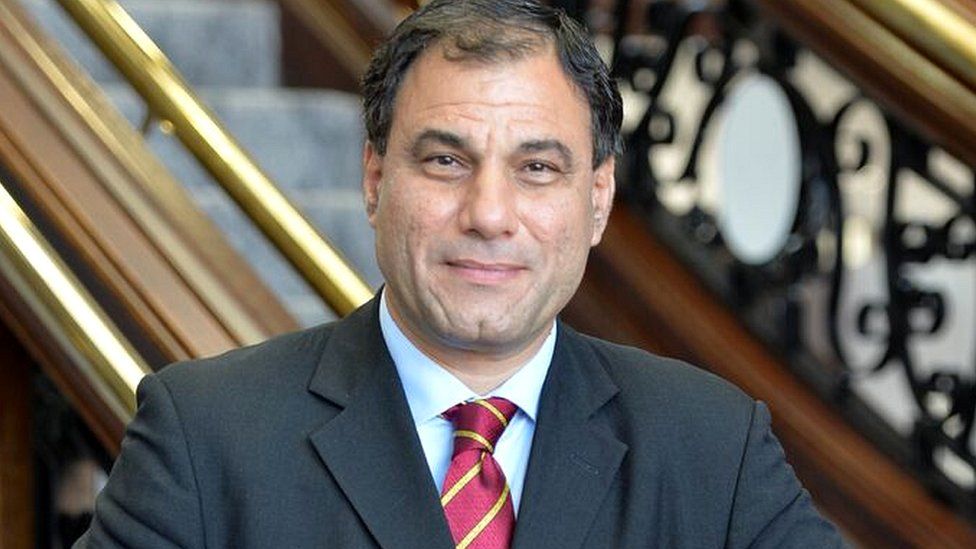Lord Bilimoria warns of university losses from Brexit
- Published

Lord Bilimoria says it is "economically illiterate" to push down numbers of overseas students and international partnerships
Canada and Australia could be the unanticipated beneficiaries from Brexit in the competition for international students, entrepreneur and university leader Lord Bilimoria has said.
The Indian-born chancellor of the University of Birmingham said an "anti-immigrant" backlash from the Brexit referendum and disputes over student visas could see UK universities losing overseas students.
He said he had received racist abuse - expressing "absolutely rabid" views - for the first time since coming to the UK in the 1980s.
There has already been a downturn in applications from EU students, and the crossbench peer said growing numbers of international students from India and China might take their tuition fees elsewhere.
Advantage Australia?
"The Australian high commissioner to India told me in no uncertain terms, 'What are you doing with international students? I need to say thank you, because you're sending them to us,'" said Lord Bilimoria.
University leaders have warned MPs that Brexit could make it harder to attract academic staff and students from EU countries.
Australia's universities are competing with the UK to attract more overseas students
Figures published last week showed almost a fifth of academic staff in UK universities were from EU countries.
But Lord Bilimoria said there was also a bigger global picture to be considered and any shift towards isolationism would have a deep negative impact on the UK's higher education system and cutting-edge research.
University research depends on international partnerships, and, he said, "closing doors" would have long-lasting damage.
The number of Indian students in the UK has fallen sharply - and Lord Bilimoria said this reflected how overseas students seemed to be seen as an immigration problem rather than a lucrative economic asset.
He also said Prime Minister Theresa May's visit to India had "played very badly" there.
More stories from the BBC's Global education series, external looking at education from an international perspective, and how to get in touch.
You can join the debate at the BBC's Family & Education News Facebook page, external.
Instead of attracting Indian students to UK universities, Lord Bilimoria said, the visit had left Indians feeling "insulted", as the biggest concern had seemed to be whether they would overstay their visas.
As well as the financial benefits - worth £29bn per year to market leaders, the United States, he said, international students represented a huge opportunity for "soft power", future influence and bridge-building.
Universities in the UK have campaigned for overseas students not to be counted in net migration figures - and Lord Bilimoria said this had been privately accepted.
"David Cameron told me, in a one-to-one discussion, that he would take them out of the figures after the referendum," he said.
But the events post-referendum took a different direction - and Lord Bilimoria criticised the current approach to overseas students as "economically illiterate".
The number of Indian students coming to the UK has fallen
Annual figures published by the Office for National Statistics last week showed numbers of overseas students had dipped by more than 40,000.
But a Department for Education spokesman said the UK will continue to value the contribution of overseas staff to universities.
"EU and international students, staff and researchers make an important contribution to our higher education sector and we want that to continue," he said.
"The UK has a long established system that supports and attracts global talent, at all stages of their career, and the government will seek to secure the best deal for universities and their staff when negotiations for exiting the EU begin."
Glass ceiling
For Lord Bilimoria, there is a wider story about a tide turning away from internationalism - a trend he deeply regrets.
"I've seen in front of my eyes the transformation of this country," he said.
"Entrepreneurship was looked down on - and now it's celebrated.
"It's one of the most entrepreneurial countries in the world.
"There was a glass ceiling.
"I was told that as a foreigner I would never get to the top.
"But I've seen that glass ceiling being shattered.
"I've seen the City of London open up from a gentleman's club, where if you didn't go to the right school or university your chances of success were limited.
"Britain and its economy has opened up to the world, becoming far more cosmopolitan, far more multicultural."
But he fears the pendulum is now swinging back.
In the aftermath of the Brexit referendum, he said, he had faced "aggressive and hurtful" abuse.
"I'm not going to be scared," he said. But he saw a "deeply unnecessary" divide opening.
Lord Bilimoria is an embodiment of crossing between cultures.
He is an Indian from a family with four generations of English education - including a grandfather at Sandhurst.
The Cobra beer he helped to create is its own bit of bridge-building - a cross between ale and lager.
But at the moment, this multicultural brew seems to have gone a little flat.
- Published6 August 2014